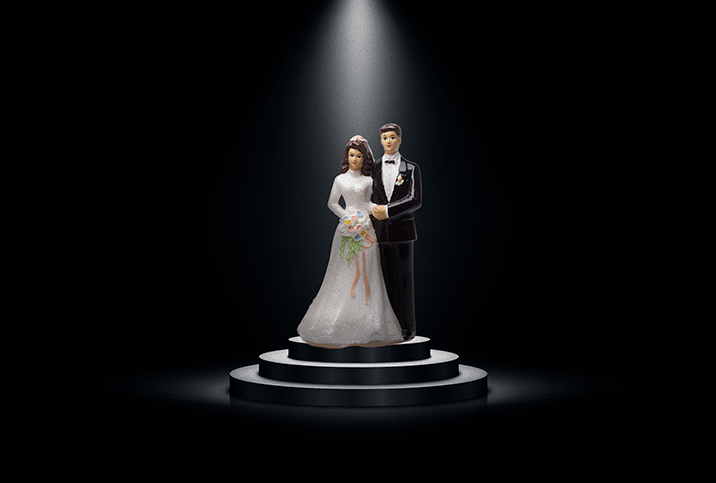What Is the Meaning of Comphet and Why Should I Care?

The process of questioning our sexuality, even if we conclude it is as initially assumed, equally involves the individual and the culture to which they belong. Compulsory heterosexuality, or "comphet," is the idea that seemingly heterosexual people may have not fully examined every aspect of their sexuality due to the culture they've grown up in.
Of course, many people will, after some introspection and soul-searching, confirm that they're heterosexual, purely based on their own feelings and not from societal expectations. For others, though, the more a personal framework is interrogated, the more the assumed sexuality falls apart.
'A simple exercise you can do on your own is to ask yourself, 'What do I believe about…?'
Chris Tompkins, M.A., a life coach and therapist based in Los Angeles, explained how such personal inner work is informed by cultural conventions.
"Compulsory heterosexuality is a theory popularized by [poet and essayist] Adrienne Rich that says heterosexuality is something learned as a result of being socialized in a dominant patriarchal society," he said, citing Rich's 1980 essay "Compulsory Heterosexuality and Lesbian Existence." "Rich argued that heterosexuality is not necessarily an automatic or inherent form of sexual expression. Ultimately, behind compulsory heterosexuality is fear: the fear of what's outside societal norms."
Queer scholars argue that by reinforcing heterosexuality as the only acceptable sexuality, other sexualities and identities become oppressed by a larger patriarchal order.
Defining comphet
"It's important to consider heteronormativity and internalized homophobia, both of which are connected to compulsory heterosexuality," Tompkins said. "Internalized homophobia is when we unconsciously absorb shameful messages we learn as children about what it means to be gay, lesbian or bisexual. It's homophobia [when it's] from the outside. It's not possible to grow up in a heteronormative and homophobic society and not be somehow influenced by either."
Thus, the default mindset, which informs our deepest feelings, comes from a set of guidelines reinforced over our lifetime, our parents' lifetimes, their parents' lifetimes and so on. The internalized homophobia we learn from ancestors can become compulsory heterosexuality, though not always, Tompkins noted.
"A person with internalized homophobia might identify as heterosexual as a result of conscious or unconscious shame, not because of compulsory heterosexuality," he explained. "Their decision to stay in a heterosexual relationship is driven by the shame, or internalized homophobia, they have about being gay, lesbian or bisexual and not necessarily because heterosexuality has been enforced upon them."
Challenges of comphet
While some of this terminology can feel academic, the lived experience of comphet is real and creates real challenges, Tompkins said.
"A person with compulsory heterosexuality may be in a heterosexual relationship and not enjoy sex or be sexually attracted to their partner," he said. "But due to dominant beliefs, they stay in a heterosexual relationship because they've never thought to question whether their sexuality could be anything other than heterosexual."
RP Whitmore-Bard, M.A., of Boulder, Colorado, is the program director of the queer-led mental health service Queer Asterisk. They explained why even the most happily heterosexual individual benefits from the thought exercises used in questioning whether they've internalized comphet beliefs.
"Everyone benefits from unpacking the systems that guide our social behavior because when we can make choices based on how we actually feel, we gain access to a greater sense of well-being and peace with ourselves," they said. "Particularly for anyone who measures their happiness with a partner on external factors—such as family approval—but finds themself feeling empty, disconnected or uncomfortable with some aspect of their romantic or sexual experience, it would be worth learning more about comphet."
Noticing dissonance in our inner life requires patience and nuance. Even well-meaning family or friends may be particularly supportive of an unsatisfying heterosexual relationship or romantic situation.
We feel we should be happy because we've accomplished what we're supposed to want. If all those checked boxes feel more like someone else's trophy rather than genuine happiness, that's worth further examination.
Dealing with comphet
Whitmore-Bard recommended seeking help when evaluating if you're dealing with comphet.
"A process of self-exploration can help us learn who we are, how we are most comfortable identifying—both when we are alone and with others—and what kinds of people we find ourselves attracted to," they said. "Therapists can help you to identify how you were socialized to feel and behave. Human beings and human experiences are often more tender and wild than we are allowed to show on the surface."
However, a person doesn't necessarily have to work with a therapist to untangle belief systems, Tompkins said. He offered DIY exercises to start at home and laid out simple steps you can take without scheduling appointments.
"When we start to explore what we believe about ourselves and life, we open up our minds to an entirely new world," Tompkins said. "A simple exercise you can do on your own is to ask yourself, 'What do I believe about…?' Once you uncover a word or belief, ask yourself, 'Is this true? Where might this belief come from? Is it my own? Is this a belief I want to continue believing? Does this word imply something positive or negative? Is this hurtful or helpful?'"
Comphet is a learned attachment to a behavior that does not serve the individual. Unshackling ourselves from what doesn't work begins with questioning why we're making and pursuing decisions that don't bring about happiness.
If you're looking for a new doctor—you've moved, your longtime physician retired or you just need a change—Giddy Telehealth takes the difficulty out of the search. The easy-to-use online service provides access to hundreds of healthcare professionals who have expertise across the full scope of medical care. Many of them specialize in women's health and offer same-day video visits.


















